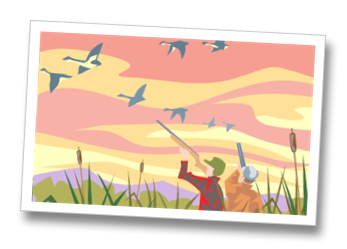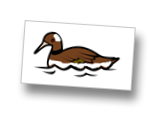Peter appeared in our boatyard. It was a long time since we’d seen each other.
"Young Roger!" Peter hailed me, stepping out of a rusty old Dodge sedan, a black one, probably about a 1950.
"Ho, the Peter," I called back across the yard. "But if you think I'm gonna run up and hug your scrawny butt, drive off!"
"Ever the clown, aren't we, Muscles?" he said, striding up and offering his hand. "Good to see you, Pal, whatever."
"I detect by your outstretched hand, Sir, that you come in good will and are not armed," I told him, grinning.
"Oh, but I am! Come see."
I walked over to Peter's car.
"Is there enough paint left holding all this rust together so you won't fall out?" I asked him.
"Never mind that, my Good Man. Behold!"
"He opened the trunk lid. On the filthy rubber mat in the trunk was a shotgun, an inexpensive 12-gage single barrel.
"I am now a duck hunter!" Peter proclaimed.
* * *
Peter and I found ourselves on dawn duck hunts before I was due at work at the marina at 8:30 every morning. My 16-gage Fox double, was an unlikely duck-hunting gun. Bored improved-cylinder and modified in its two barrels, it was perfect for "upland hunting": shooting rabbits and quail that popped out quickly and were gone within 35 yards. A lot of traditional duck hunting involved bigger, hardier targets at ranges more nearly like 40 and 50 yards. For that, Peter's gun was great because most single-barrel shotguns have full-choke barrels, which help hold the shot pattern together at max effective shotgun range.

At dawn, however, Peter and I could walk up puddle ducks, normally mallards or blacks -- very good to eat -- and roust them at close range while they were feeding. At this, my gun was perfect. On a good jump, I could kill two while Peter, slower to shoot, unlimbered his long single to dump an escapee at the long range for which his gun was best, 40 yards or so. That didn't happen often. I recall only twice when we made such a sensational triple score.
We moved into Frank’ rental trailer together at the first of the year during this normal winter unemployment season in the Thousand Islands, to save money together. The dinette end of the trailer was only 30 feet from the edge of the Saint Lawrence, so we had a good place to watch for ducks and any other Saint Lawrence River activity.
One day before duck-hunting season ended, Peter shot a little black-and-white duck. We looked it up in our little Audubon guide book for ducks and determined that it was a bufflehead. Normally, the book’s description for each duck included a note about the duck’s normal diet and eating habits. This was curiously absent in the bufflehead description. Why this was important to us was because ducks that eat fish aren’t tasty. We knew not to shoot the big, low-flying, saw-billed mergansers because all they eat is fish. The locals simply called them fish ducks.

I plucked and cleaned the bufflehead, and popped it into the oven to roast as though it were a mallard or a black. Soon the trailer smelled like a fish market gone bad. I finished the roasting, and we took the little duck to the table and divided it between us. One fork full was enough to tell us we’d made an awful mistake. Neither one of us could gag it back. We bagged the bufflehead into the garbage, turned down the heat, flung open the windows to air the trailer, and rode up to O’Briens’ in Clayton for a few drafts of beer for supper.
At the bar, one of the old locals, Garth Robillard, laughed at our supper misadventure.
“You should’ve planked it!” Garth said.
“Huh?” I said, “How’s that?”
“Planked your duck,” he said. “Well, first you parboil it for awhile. You always do that with fish duck, maybe with a little apple cut up into it too.”
“We didn’t know it was a fish duck,” I said.
“Eh? Well, that’s too bad, of course,” he said. “You always parboil a fish duck.”
By this time, the other old locals in the bar had gone silent, turned toward us, and pricked up their ears. Garth talks loud.
“While she’s parboilin’,” Garth continued, “You go outside and build yourself a campfire, a nice little one, not too big, and get a cedar plank.”
“How big a plank, Garth,” Peter asked.
“Oh, a piece of one-by thick’ll do, maybe a big cedar shingle, wide enough to hold your duck splayed out, of course. See, when your fire gets right, you split your duck down the back and nail it to the plank. Then you prop the plank up beside the fire. The duck roasts on the plank, reflector style.”
“How do you know when the duck is done?” I asked. This was sounding tasty, rather campfire gourmet.
“Oh, you’ll know,” Garth said. “And when she’s done, of course, you take her off the plank, throw her away, and eat the plank!”
All the old men burst into guffaws. Peter turned red in the face. I felt my own jaw hanging slack. So much for buffleheads, I thought.
By David Whitford
David Whitford’s professional background reads he was an IBM technical writer. However he is quick to report his overall background is as an exiled River Rat; boat mechanic at Reed's, Mercers, & central Florida; and as a general misfit.
He now lives in East Virginia (near Williamsburg now). He is a contemporary of Dick Whithington and wrote TI Life when he read about Dick’s experiences in Winter Islanders. Dave wrote, “ I also wintered over in Fishers Landing for a couple of years. Okay, that's not on an island, but I get the gist of Dick's articles: water lines freezing, fishing on the ice out front (when the ice is good), and so on. I also remember Paul Thiebault's monumental airboat ("ice punt") with the 7-cylinder Wasp Radial on it ..."
Dave has written numerous fact-based fiction stories about his growing-up time in the Islands. This is one of them.